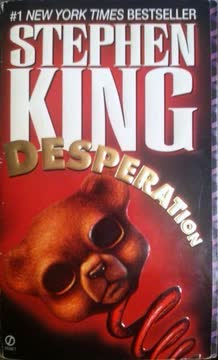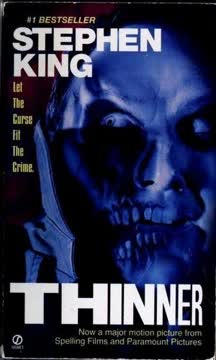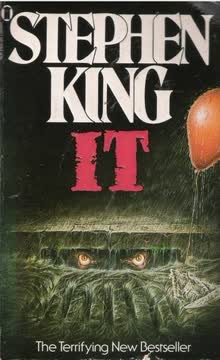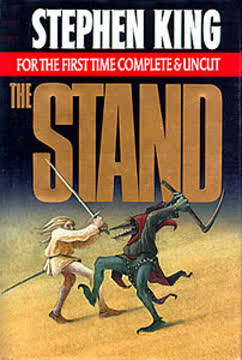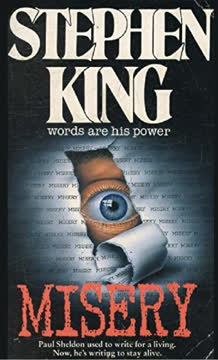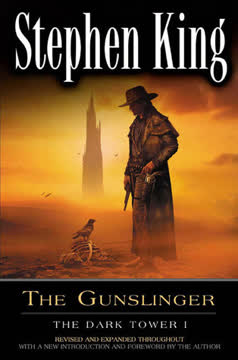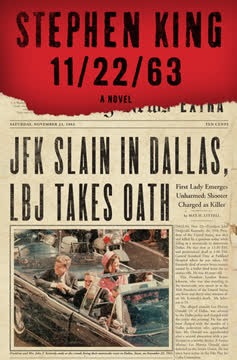Plot Summary
The Desert's Warning Signs
Peter and Mary Jackson, driving across Nevada's "Loneliest Highway," are unsettled by the desert's emptiness and a dead cat nailed to a sign. Their discomfort grows as a police cruiser stalks them, culminating in a tense stop by Collie Entragian, the town cop of Desperation. The encounter, initially routine, quickly turns sinister as Entragian's behavior becomes erratic and menacing. The couple is arrested after marijuana is found in their trunk—planted or forgotten, it's unclear. The desert's vastness and the bizarre, almost supernatural, events foreshadow the horror to come, as the Jacksons are swept into a nightmare far beyond a simple traffic stop.
The Lawman's Deadly Game
Entragian's true colors emerge as he brings the Jacksons into Desperation, a nearly deserted mining town. The town is littered with signs of violence—dead animals, abandoned vehicles, and cryptic graffiti. Entragian's size and strength are matched only by his unpredictability and cruelty. He executes Peter in cold blood and imprisons Mary with other captives, including the Carver family and an old veterinarian, Tom Billingsley. The survivors quickly realize that Entragian is not just a madman but something more, something inhuman, as he speaks in strange tongues and commands the desert's wildlife with supernatural authority.
Trapped in Desperation
The Carver family—Ralph, Ellen, David, and little Kirsten—are taken by Entragian after their RV is disabled by a police spike strip. In the town jail, they meet Mary and Tom, and soon, the famous writer Johnny Marinville, who has also been arrested under false pretenses. The group witnesses Entragian's escalating violence, including the murder of Kirsten. The survivors are terrorized not only by Entragian but by the unnatural behavior of the town's animals, which seem to serve him. The jail becomes a crucible of fear, grief, and the first stirrings of resistance.
The Carver Family's Ordeal
Ralph and Ellen Carver, with their children, are forced to confront the horror of Kirsten's death and Ellen's abduction by Entragian. David, the eleven-year-old son, is traumatized but finds solace in prayer, recalling a past miracle when his faith saved a friend. As the survivors plot escape, David's spiritual journey becomes central. His prayers and visions hint at a larger cosmic battle, and he begins to sense that the evil in Desperation is ancient and supernatural, not merely the madness of a single man.
The Writer's Road to Ruin
Johnny, a once-great novelist, is on a cross-country motorcycle trip, seeking redemption and material for a new book. His encounter with Entragian is brutal—he's beaten, humiliated, and nearly killed. Johnny's skepticism and self-loathing are challenged as he witnesses the supernatural events in Desperation. His journey becomes one of self-discovery, as he's forced to confront his failures, his mortality, and the possibility of grace. Johnny's transformation is mirrored by the town's descent into chaos, and he becomes an unlikely leader among the survivors.
The Gathering of Survivors
As the survivors escape the jail, they are joined by Steve Ames, Johnny's road manager, and Cynthia Smith, a tough, streetwise hitchhiker. They take refuge in the abandoned American West movie theater, where they share their stories and piece together the nature of the evil they face. Audrey Wyler, a geologist, joins them, but she is already infected by the town's darkness. The group realizes that Entragian is merely a vessel for something older and more powerful—Tak, an ancient evil awakened by mining operations at the China Pit.
Tak: The Unformed Evil
Through David's visions and the survivors' discoveries, the nature of Tak becomes clear. Tak is a primordial force, imprisoned beneath the earth in the China Pit, now unleashed by human greed and curiosity. It possesses and destroys its hosts—first Ripton, then Josephson, then Entragian, and finally Ellen Carver—leaving a trail of death and madness. Tak commands the desert's animals and infects people through ancient stone totems called can tahs. The survivors realize that Tak's power is growing, and that it seeks to escape its prison and spread its evil beyond Desperation.
The Language of the Dead
Tak's power is rooted in language—the "language of the unformed," a series of guttural, ancient words that command both animals and people. Those who touch the can tahs are corrupted, losing their humanity and becoming vessels for Tak's will. Audrey succumbs, attacking David and the others before dying in a grotesque transformation. The survivors learn that Tak's evil is cyclical, tied to the land and the mining that disturbs its prison. The only hope is to reseal the China Pit and prevent Tak from escaping.
Escape and Revelation
The survivors split up—Mary is abducted by the possessed Ellen, while Johnny, David, and the others plan their final stand. Mary escapes her prison, braving a nest of deadly animals, and flees toward the town. Johnny, after a crisis of faith, is brought back into the fold by David, who reveals that Johnny was his spiritual guide in a vision. The group reunites at the China Pit, where they prepare to confront Tak and seal the an tak, the well of the worlds, with explosives.
The Power of Faith
David's journey from trauma to faith is central to the group's survival. His prayers and visions guide the survivors, and his willingness to sacrifice himself inspires the others. Johnny, once a skeptic, finds purpose and redemption in David's example. The survivors realize that only by acting together, in faith and selflessness, can they hope to defeat Tak. The final confrontation is as much spiritual as physical, with David's faith and Johnny's courage at the heart of their resistance.
The Sacrifice at China Pit
At the China Pit, the survivors face Tak's last vessel—a golden eagle possessed by the ancient evil. In a brutal struggle, Ralph Carver is killed protecting his son. Johnny, wounded and near death, descends into the an tak, the heart of Tak's power. Using a shotgun shell and explosives, he seals the well, sacrificing himself to trap Tak once more. The explosion collapses the pit, destroying Tak's physical form and ending its reign of terror—at least for now.
The End of Tak's Reign
With Tak defeated, the survivors—Steve, Cynthia, Mary, and David—escape the collapsing pit and drive out of Desperation. The town is a graveyard, filled with the bodies of its inhabitants and the animals Tak commanded. The survivors are traumatized, but alive. They agree to tell a version of the story that the authorities will believe, leaving the true horror buried with Tak. The supernatural events are covered up, and the survivors are left to grapple with the aftermath.
The Aftermath and the Road
As they leave Desperation, the survivors are haunted by grief and loss. David, orphaned and alone, is comforted by Mary and Cynthia. Johnny's sacrifice is honored, and his spiritual transformation is recognized as the key to their survival. The survivors agree to stay together as long as possible, finding solace in their shared ordeal. The road ahead is uncertain, but they are united by the knowledge that they faced evil and survived.
The Price of Survival
David is left to mourn his family, struggling with the knowledge that God is both cruel and loving. The survivors are marked by their experiences, each carrying scars both physical and emotional. The story ends with a sense of ambiguity—evil has been defeated, but at a terrible cost. The survivors must find a way to live with what they have seen and done, and to find meaning in their suffering.
Excused Early
As they drive away from Desperation, David finds a blue "Excused Early" pass in his pocket—a token from his past, and a sign of grace. The message, written in Johnny's hand, is a simple one: "God is love." Despite the horror and loss, the survivors are offered a chance at healing and redemption. The story ends with David praying, seeking comfort and meaning in the aftermath of evil, and the survivors heading into the dawn, forever changed but still alive.
Characters
David Carver
David is an eleven-year-old boy whose faith is tested and refined by trauma. After witnessing his sister's death and his mother's possession, David becomes the group's spiritual guide. His prayers and visions are central to the survivors' resistance against Tak. David's journey is one of grief, doubt, and ultimately, acceptance of both God's cruelty and love. He is marked by survivor's guilt but also by a deep sense of purpose, embodying the novel's themes of sacrifice, faith, and the struggle to find meaning in suffering.
Johnny Marinville
Johnny is a once-famous novelist, now adrift and self-loathing, whose journey through Desperation forces him to confront his failures and rediscover faith. Initially skeptical and self-absorbed, Johnny becomes a reluctant leader and, ultimately, a martyr. His transformation—from cynic to believer, from coward to hero—is the novel's emotional core. Johnny's sacrifice at the China Pit is both an act of redemption and a testament to the power of grace, illustrating the possibility of change even in the most broken souls.
Mary Jackson
Mary is a poet and Peter's wife, thrust into horror by Entragian's arrest and Peter's murder. Her journey is one of terror, resilience, and self-discovery. Mary's skepticism is challenged by the supernatural events in Desperation, and she becomes a fierce protector of David and the other survivors. Her escape from captivity and her role in the final confrontation with Tak demonstrate her courage and adaptability. Mary's grief is profound, but she finds strength in connection and the hope of healing.
Steve Ames
Steve is Johnny's road manager, a practical, resourceful man with a background in the music industry. He provides logistical support and emotional stability to the group. Steve's relationship with Cynthia offers moments of levity and humanity amid the horror. His loyalty to Johnny and the other survivors is unwavering, and his willingness to follow David's lead, despite his skepticism, marks his quiet heroism.
Cynthia Smith
Cynthia is a young woman with a troubled past, picked up by Steve as a hitchhiker. Her wit, resilience, and emotional intelligence make her an essential member of the group. Cynthia's relationship with Steve provides warmth and hope, and her ability to adapt to the unfolding nightmare is a testament to her strength. She is both a skeptic and a believer, open to the possibility of grace even as she questions it.
Ralph Carver
Ralph is a loving but flawed father, devastated by the loss of his daughter and the possession of his wife. His struggle to protect David and the other survivors is marked by guilt and desperation. Ralph's death in the final confrontation with Tak is both tragic and redemptive, as he sacrifices himself to save his son. His journey is one of grief, love, and the ultimate price of survival.
Ellen Carver
Ellen is Ralph's wife and David's mother, possessed by Tak after Entragian's body fails. Her transformation from loving mother to monstrous vessel is one of the novel's most horrifying elements. Ellen's fate embodies the novel's themes of loss, corruption, and the fragility of identity in the face of evil.
Collie Entragian
Entragian is the town cop, initially presented as a grotesque, menacing figure. His possession by Tak transforms him into a force of supernatural evil, capable of commanding animals and spreading madness. Entragian's physical and psychological disintegration mirrors the town's collapse, and his role as Tak's vessel is central to the novel's exploration of power, corruption, and the loss of self.
Tom Billingsley
Tom is an old, alcoholic vet who provides the survivors with knowledge of Desperation's history and the legend of the China Pit. His struggle with addiction and his ultimate sacrifice add depth to the group's dynamic. Tom's knowledge and courage are instrumental in the survivors' escape, and his death is a poignant reminder of the cost of survival.
Tak
Tak is the true antagonist, an ancient force imprisoned beneath the China Pit. It possesses and destroys its hosts, spreading madness and death. Tak's power is rooted in language, ritual, and the corruption of the natural world. Its desire to escape and dominate is countered by the survivors' faith and self-sacrifice. Tak embodies the novel's themes of evil, entropy, and the cyclical nature of violence.
Plot Devices
Possession and Corruption
Tak's primary method of spreading evil is through possession—first of animals, then of humans. Each host is used up and discarded, leaving a trail of death and madness. The can tahs, ancient stone totems, serve as conduits for Tak's power, corrupting those who touch them. The language of the unformed, a guttural, ancient tongue, is both a tool of control and a symbol of Tak's alien nature. This device allows King to explore themes of identity, free will, and the insidious nature of evil.
Faith and Sacrifice
David's faith is both a source of strength and a crucible of suffering. His prayers, visions, and willingness to sacrifice himself are central to the group's resistance. Johnny's journey from cynicism to faith mirrors the group's collective struggle, and his ultimate sacrifice at the China Pit is the novel's climactic act of redemption. The power of faith—tested, doubted, and ultimately affirmed—is the survivors' only weapon against Tak.
Cyclical Evil and Historical Repetition
The legend of the China Pit, the massacre of Chinese miners, and the recurring outbreaks of violence in Desperation underscore the cyclical nature of evil. Mining, greed, and the disturbance of ancient forces serve as catalysts for Tak's return. The survivors' struggle is both a repetition and a breaking of the cycle, as they confront the consequences of history and the possibility of change.
Foreshadowing and Symbolism
King uses foreshadowing extensively—dead animals, cryptic graffiti, and the behavior of the town's wildlife all signal the presence of supernatural evil. The can tahs and the language of the dead are recurring symbols of corruption and the loss of self. The "Excused Early" pass, found by David at the end, serves as a symbol of grace, forgiveness, and the possibility of healing.
Narrative Structure and Multiple Perspectives
The novel shifts between multiple points of view—David, Johnny, Mary, Steve, and others—allowing for a rich exploration of character and theme. Flashbacks, visions, and spiritual experiences deepen the narrative, while the convergence of the survivors at the China Pit provides a unifying climax. The structure mirrors the chaos and complexity of the events, while ultimately affirming the power of connection and collective action.
Analysis
Desperation is Stephen King's meditation on the nature of evil, faith, and the human capacity for both cruelty and grace. The novel uses the horror of supernatural possession and the collapse of a small town to explore deeper questions of free will, suffering, and redemption. Tak, the ancient evil, is both a literal and metaphorical force—an embodiment of entropy, violence, and the consequences of disturbing what should remain buried. The survivors' struggle is as much spiritual as physical, with David's faith and Johnny's redemption at the heart of their resistance. King suggests that evil is cyclical, rooted in history and human weakness, but that it can be confronted and contained—if not destroyed—by selflessness, courage, and the willingness to act in the face of despair. The novel's ending, with its message of love, forgiveness, and the possibility of healing, offers hope amid horror, affirming the resilience of the human spirit even in the darkest of places.
Last updated:
FAQ
0. Synopsis & Basic Details
What is Desperation about?
- A Desert Nightmare Unfolds: Desperation plunges a diverse group of travelers into a remote Nevada mining town where they are brutally captured by Collie Entragian, a monstrously oversized and increasingly deranged sheriff, who is merely a vessel for an ancient, malevolent entity known as Tak.
- Struggle Against Ancient Evil: The narrative follows the survivors—including a cynical novelist, a grieving family, a resourceful road manager, and a streetwise hitchhiker—as they uncover the true nature of Tak, an entity awakened by mining operations in the China Pit, and fight for their lives against its escalating supernatural influence.
- Faith, Sacrifice, and Survival: At its core, the story explores themes of faith, free will, and sacrifice, particularly through the eyes of an eleven-year-old boy, David Carver, whose profound spiritual connection becomes the group's unlikely guide in their desperate struggle to contain Tak and escape the cursed town.
Why should I read Desperation?
- Intense Psychological Horror: Readers seeking a deep dive into the psychological toll of extreme terror will find King's exploration of fear, grief, and the breakdown of sanity compelling, as characters grapple with both human and supernatural evil.
- Rich Thematic Depth: Beyond the visceral horror, the novel offers a profound meditation on faith, the nature of God's cruelty and love, and the cyclical patterns of human greed and violence, inviting readers to ponder complex philosophical questions.
- Masterful Character Arcs: Witness the remarkable transformations of characters like Johnny Marinville, a jaded writer finding unexpected redemption, and David Carver, an ordinary boy thrust into the role of a reluctant prophet, making their struggles deeply resonant and emotionally impactful.
What is the background of Desperation?
- Isolated Mining Town Setting: The story is set in the fictional, desolate mining town of Desperation, Nevada, a place steeped in the history of gold and silver mining, particularly the "China Pit" (Rattlesnake Number One), which serves as the ancient prison for the entity Tak.
- Historical Exploitation Echoes: The narrative draws on the brutal history of Chinese miners in the 19th century, who were exploited and buried alive in the China Shaft, creating a historical backdrop of human cruelty and suffering that foreshadows Tak's reawakening and its cyclical nature of violence.
- Geographical and Cultural Isolation: The remote, harsh desert landscape of central Nevada, often referred to as "The Loneliest Highway in America," emphasizes the characters' isolation and vulnerability, while the town's sparse, insular culture contributes to the sense of being cut off from conventional help and understanding.
What are the most memorable quotes in Desperation?
- "God is cruel.": David Carver's stark, repeated declaration, often delivered with a child's innocent yet profound conviction, encapsulates a central theological debate of the novel, challenging conventional notions of divine benevolence in the face of immense suffering.
- "Sometimes he makes us live.": Johnny Marinville's chilling realization, delivered to David in the China Shaft, redefines cruelty not as death, but as the forced continuation of life in the face of unbearable trauma, highlighting the profound psychological impact of survival.
- "In these silences something may rise.": This cryptic graffiti, found spray-painted on the wall of the Town Office, serves as a potent thematic motif, foreshadowing the emergence of Tak and the ancient evils that stir in the quiet, forgotten corners of the world.
What writing style, narrative choices, and literary techniques does Stephen King use?
- Visceral and Unflinching Detail: King employs a highly descriptive and often grotesque style, immersing the reader in the physical and psychological horrors through vivid sensory details, such as the stench of decay, the sight of mutilated bodies, and the internal monologues of terrified characters.
- Interweaving Perspectives and Internal Monologue: The narrative structure frequently shifts between multiple third-person perspectives, offering deep insight into each character's thoughts, fears, and coping mechanisms, often blurring the line between external reality and internal delusion, particularly with Johnny Marinville's self-aware, cynical inner voice.
- Biblical Allusion and Genre Subversion: King extensively uses biblical allusions (e.g., Daniel in the lions' den, the Angel of Death, Job) to frame the supernatural conflict, while simultaneously subverting traditional horror tropes by presenting a God who is both a source of salvation and a force of refining cruelty, challenging reader expectations.
1. Hidden Details & Subtle Connections
What are some minor details that add significant meaning?
- The "Zone of Perception": Peter Jackson's early musing about the desert being "outside your zone of perception" (Chapter 1) subtly foreshadows the supernatural events that defy rational understanding, suggesting that the characters are entering a reality beyond their comprehension.
- The "Mr. Smiley-Smile" Stickers: Deirdre Finney's yellow smile stickers, found on the bag of marijuana and later on the stone can tah, initially represent her carefree, drug-addled personality but become a chilling symbol of Tak's insidious, mocking presence, turning innocence into an emblem of corruption.
- The "Reek-reek-reek" Weathervane: The monotonous squeaking of the leprechaun weathervane on Bud's Suds (Chapter 1, Chapter 2) acts as a recurring auditory motif, symbolizing the town's stagnant, repetitive nature and the inescapable, almost mechanical, presence of evil.
What are some subtle foreshadowing and callbacks?
- Johnny's Vietnam Flashbacks: Marinville's recurring thoughts of Vietnam, particularly the "kozmic Vietnam blues" and the "immaculate good cheer" of soldiers doing terrible things (Part III, Chapter 3), subtly foreshadow the extreme violence and detached cruelty he will witness and participate in, linking the horrors of war to Tak's influence.
- The "House of the Wolf, the House of the Scorpion": The epigraph to Part I, "HIGHWAY 50: IN THE HOUSE OF THE WOLF, THE HOUSE OF THE SCORPION," directly foreshadows the animalistic manifestations of Tak's power, particularly the wolf and scorpion totems, and the predatory nature of the evil awaiting the travelers.
- Billingsley's "Drunkfish": Tom Billingsley's admission of drawing "drunkfish" on the ladies' room wall (Part III, Chapter 2) subtly foreshadows his own drunken state and eventual demise, while also hinting at the warped, hallucinatory reality that Tak imposes on the town.
What are some unexpected character connections?
- Johnny Marinville as David's "Dream-Guide": David's vision of Johnny as his spiritual guide in the "Land of the Dead" (Part IV, Chapter 5), singing "The Rascals" song that was playing when Johnny "died" (stopped changing), creates an unexpected, profound bond between the cynical writer and the young prophet, transcending their initial antagonistic relationship.
- Ellen Carver's Yeast Infection: The seemingly mundane detail of Ellen's yeast infection (Part IV, Chapter 1) is revealed as the "domino" that allowed Tak to possess her, highlighting the insidious and opportunistic nature of the entity, which exploits even minor human vulnerabilities.
- Billingsley's Horse and Audrey's Legs: Billingsley's memory of treating Audrey Wyler's horse, Sally, and his later appreciation of Audrey's legs (Part III, Chapter 2, Part III, Chapter 4) creates a subtle, almost voyeuristic connection between the old vet and the geologist, hinting at the underlying human desires and weaknesses that Tak preys upon.
Who are the most significant supporting characters?
- Tom Billingsley, the Historian-Witness: The old veterinarian, Tom Billingsley, is crucial not only for his knowledge of Desperation's dark history and the China Pit legend but also as a moral compass, whose struggle with alcoholism and eventual sacrifice underscore the human cost of confronting evil.
- Audrey Wyler, the Corrupted Scientist: Audrey, the geologist, initially represents rationalism and scientific skepticism, but her gradual corruption by Tak and her grotesque transformation serve as a chilling demonstration of the entity's power to twist and destroy human identity, highlighting the fragility of reason against supernatural forces.
- Steve Ames and Cynthia Smith, the Pragmatic Protectors: Steve and Cynthia, Johnny's road manager and the hitchhiker, provide essential logistical support, emotional grounding, and a sense of enduring humanity amidst the chaos, acting as loyal companions and protectors, particularly for David.
2. Psychological, Emotional, & Relational Analysis
What are some unspoken motivations of the characters?
- Johnny's Quest for Redemption: Beneath his cynical facade and pursuit of a new book, Johnny Marinville is driven by an unspoken desire for personal and literary redemption, seeking to atone for past failures and find meaning in a life he perceives as increasingly hollow. His "Achilles' heel" for stories (Part IV, Chapter 2) reveals his deep-seated need for narrative and purpose.
- Ralph's Guilt and Desperation: Ralph Carver's fierce protectiveness of David and his desperate attempts to escape are fueled by profound guilt over Kirsten's death and Ellen's possession, believing his gambling and vacation choices led to their family's tragedy. His internal struggle is a silent battle against self-blame.
- Mary's Survival Instinct and Grief: Mary Jackson's initial focus on survival and her later acts of defiance are underpinned by a deep, unspoken grief for Peter, which she channels into a fierce determination to protect David and confront Tak, finding strength in her loss rather than succumbing to it.
What psychological complexities do the characters exhibit?
- Johnny's Self-Loathing and Denial: Johnny Marinville constantly battles self-loathing, using humor and cynicism as defense mechanisms. His internal monologues reveal a man deeply aware of his flaws ("literary Elvis Presley," "asshole") but struggling to overcome them, culminating in a profound crisis of identity when confronted by Tak's truth.
- David's Burden of Prophecy: David Carver exhibits the psychological strain of being a child prophet, grappling with visions and divine messages that are both terrifying and empowering. His "God is cruel" mantra reflects his struggle to reconcile suffering with faith, showcasing the immense burden placed on his young mind.
- Audrey's Rationality vs. Corruption: Audrey Wyler's scientific mind initially resists the supernatural, but her gradual possession by Tak reveals the terrifying vulnerability of human intellect to overwhelming evil. Her transformation highlights the psychological horror of losing one's self and becoming a puppet for an alien will.
What are the major emotional turning points?
- David's Prayer for Brian: David's desperate prayer for his friend Brian's recovery (Part I, Chapter 4), and its miraculous answer, marks his initial emotional turning point, solidifying his faith and setting him on a path of spiritual connection that will later guide the survivors.
- Johnny's Confrontation with "Terry": Johnny's hallucination of his ex-wife, Terry, on the wall of the lab (Part IV, Chapter 3), who confronts him about his "giving up real life completely," serves as a critical emotional reckoning, forcing him to acknowledge his denial and re-engage with his purpose.
- Mary's Act of Defiance in the Pit: Mary's decision to disable Entragian's cruiser and sabotage the mining equipment (Part IV, Chapter 2), despite her terror and physical pain, represents a powerful emotional turning point, transforming her from a victim into an active agent of resistance against Tak.
How do relationship dynamics evolve?
- David and Johnny's Unlikely Mentorship: The relationship between David and Johnny evolves from initial skepticism and irritation to a profound, almost spiritual, mentorship, with David guiding Johnny towards faith and Johnny finding a protective, paternal role, culminating in Johnny's sacrifice for the boy.
- Steve and Cynthia's Developing Trust: Steve and Cynthia's relationship blossoms from a pragmatic hitchhiker-driver dynamic into one of deep trust and mutual support, their shared trauma forging a bond that provides moments of humanity and levity amidst the horror.
- The Survivors as a "Collie Entragian Survival Society": The disparate group of survivors, initially strangers, coalesce into a makeshift family, bound by their shared ordeal and collective purpose. Their individual strengths and weaknesses interlock, demonstrating the power of unity against an overwhelming evil.
4. Interpretation & Debate
Which parts of the story remain ambiguous or open-ended?
- The Nature of Tak's Origin: While David explains Tak as an "ancient one, the unformed heart" (Part IV, Chapter 4) from a place "not on earth at all," its ultimate origin and true form remain largely ambiguous, leaving readers to ponder whether it's a demon, an alien entity, or a primordial force of entropy.
- The Extent of God's Intervention: The novel leaves open to interpretation the precise nature and extent of God's direct intervention. While David experiences visions and answered prayers, the suffering and sacrifices (e.g., Kirsten, Ralph) raise questions about divine cruelty and the limits of free will, making God's role a complex, debatable element.
- The Future of Desperation and Tak: Despite Tak being sealed in the China Pit, Johnny's question about the mining company potentially reopening the shaft (Part V, Chapter 2) and David's response ("That's not our problem—that's God's problem") leaves the long-term fate of Desperation and the potential for Tak's return open-ended, suggesting a cyclical nature of evil.
What are some debatable, controversial scenes or moments in Desperation?
- The Murder of Kirsten Carver: The brutal, casual murder of seven-year-old Kirsten Carver by Entragian (Part I, Chapter 2) is a highly controversial scene, shocking readers with its graphic violence against a child and immediately establishing the novel's unflinching depiction of evil.
- Johnny Marinville's "Suck My Cock" Scene: Entragian's demand for Johnny to perform oral sex (Part I, Chapter 4) is a deeply disturbing and controversial moment, pushing boundaries of sexual violence and humiliation, and serving as a catalyst for Johnny's internal defiance rather than his submission.
- David's "God is Cruel" Theology: David's repeated assertion that "God is cruel" (Part II, Chapter 2, Part IV, Chapter 4) is a controversial theological stance within the narrative, challenging traditional religious comfort and forcing characters (and readers) to confront the problem of evil in a world supposedly governed by a benevolent deity.
Desperation Ending Explained: How It Ends & What It Means
- Johnny's Sacrifice and Tak's Containment: The Desperation ending explained reveals Johnny Marinville's ultimate sacrifice, as he descends into the China Shaft, the "ini" or "well of the worlds," and uses ANFO explosives and a shotgun shell to seal Tak's physical manifestation within the earth, dying in a "bloom of brilliant, soundless red." This act contains Tak, but does not destroy it, emphasizing the cyclical nature of evil.
- David's "Excused Early" Pass and God's Love: As the survivors escape, David finds his "Excused Early" pass, which Johnny had taken from him and left in his pocket. On it, Johnny has scrawled "God is love" (Part V, Chapter 5). This final message, delivered by the cynical writer, offers a profound counterpoint to David's "God is cruel" theology, suggesting that love and grace can emerge even from the deepest despair.
- The Price of Survival and Lingering Scars: The survivors are left traumatized and forever changed, agreeing to fabricate a story for the authorities to cover up the supernatural events. The ending signifies that while they escaped physical death, they carry deep emotional and psychological scars. The "Excused Early" pass symbolizes not just David's release from his prophetic burden but also a form of divine forgiveness and a chance for a new beginning, albeit one haunted by memory.
Review Summary
Desperation by Stephen King is a horror novel that polarizes readers. Many praise its intense atmosphere, compelling characters, and gripping plot centered around a supernatural evil in a small Nevada town. The religious themes and gore are divisive elements. Some find the ending disappointing compared to the strong start. Readers appreciate King's skillful writing and ability to create tension, though some criticize the pacing and character development in the latter half. Overall, it's considered a solid King novel, if not his best work.
Similar Books
Download PDF
Download EPUB
.epub digital book format is ideal for reading ebooks on phones, tablets, and e-readers.
